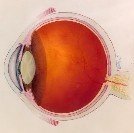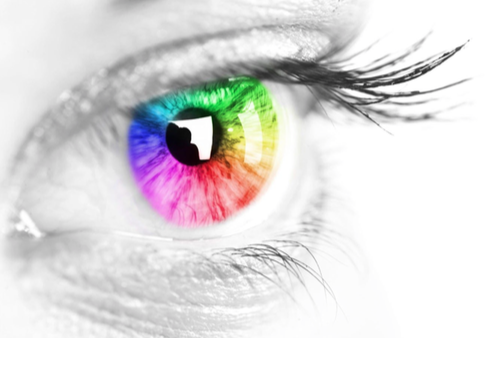Macular Degeneration Prognosis - A Personal Story
I wish someone told me about their experience with wet macular degeneration when I was diagnosed. Having no guidance can be scary. This is my personal story with dry, then wet AMD in both eyes, and begins with who I am and what I do.
I’m a photographer and portrait artist; I need my eyes. Imagine clientele coming to me if they think I can’t see! That hasn’t happened, because of a great optometrist and terrific retina specialist. Part of my story is a recurring nightmare I had. I was in a gray room and it was locked. I was alone, and someone had taken my crayons. I woke up in a cold sweat, terrified. I don’t paint with crayons, but my world is filled with color — color that was gone in my nightmare.
I was a painter first, then became a photographer. Now I combine painting and photography for my clients, and teach the combination of photography and art. I’ve had the honor of teaching for professional photographers and artists all over the world. I love what I do—and I don’t know how to do anything else.
For years, my optometrist told me that I’m far more vision conscious than most patients, and he’s right—I am acutely aware of changes in my sight. I’m sure that’s the reason my macular degeneration was caught early.
I nagged my optometrist for years to let me wear contacts; I’ve always hated glasses, but my astigmatism was too great. So I begged for corrective eye surgery, and was again refused. That’s why I kept him as my doctor—he wouldn’t do what I asked because it wasn’t right for me!
When I started seeing “light shows”—colored lights that looked like broken glass around my vision—my optometrist identified them as ocular migraines. I had those for years, although only occasionally. I often wonder if they were a precursor to macular degeneration.
Dry Age Related Macular Degeneration
Naturally, I called him when I suddenly noticed “dirty spots” in the sky and on the ceiling — spots I knew weren’t floaters.
I noticed smoky areas, like circles, on the ceiling when I woke up one morning, and they wouldn’t go away. They’d dissipate, I could see through them, but they always came back. I wasn’t particularly alarmed at first. I just concluded that I needed a new glasses prescription. I made an optometrist appointment and joked that I had developed a fetish for cleaning my glasses and had worn them out, since I was seeing wavy lines and blurry edges.
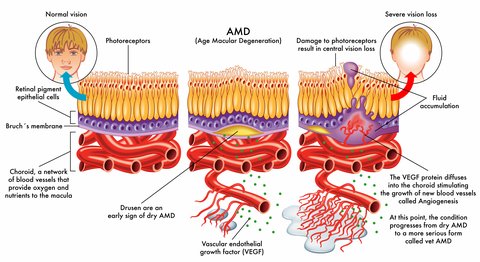
I asked him again about the eye surgery, and his refusal was adamant; I wasn’t a candidate. He made me an appointment with a retina specialist. My next question, with a smile, was “Do I need to be scared?” When he gently answered “Not yet” I got scared.
My appointment with the first retina specialist was Feb. 23, 2006. The exact date is burned into my memory; I’ll never forget it. I didn’t know why I was sent there, except for those smoky spots. I was uneasy enough that I asked my husband to go with me. He’s always there when I need him, and I did that day.
I experienced the tests that use extremely bright lights to see into the eyes. The OCT (Ocular Coherence Tomography) and fluorescein angiogram (FA) tests were given with no explanation except that they were diagnostic tools.
The doctor was very busy, with a waiting room full of patients. While I waited for him to analyze the test results, my husband and I were seated in a waiting room with several other patients—and my eyes were dilated.
We “watched” a video explaining macular degeneration — the first time I ever remember hearing those words.
All I heard, in my terror, was “You will never be completely blind.” Blind? I thought, “My God, they can’t be talking about me.”
I was in tears. The doctor passed by, and I stopped him with “Do you know what I do for a living?” His answer as he passed was that it didn’t matter what I did, I was lucky the macular degeneration in both of my eyes was dry. Lucky? I’d hardly call that luck.
I asked what my prognosis was, and he said “Just take the vitamins and go back to the optometrist in a year. It could be 10 years before your central vision goes—or you could wake up tomorrow with a bleed and severe vision loss. Call me if that happens.” Then he was gone.
Like all, I’ve had difficult times, but never a time when I felt so helpless and hopeless. I was in complete despair. I’m a photographer, a painter, and the world around me was crashing.
Macular Degeneration Support
I’m a strong woman, but I couldn’t stop crying. Even though I could still see, I was paralyzed with fear. I couldn’t work, canceled speaking engagements, and was terrified of falling asleep because I thought I might wake up to a world engulfed in darkness because of his brief remark as he passed.
I searched the internet for days, trying to learn everything about macular degeneration. Late one night, I found a web site for a local company that researched eye diseases. I clicked the “contact” button and sent a very despairing message, asking if I could be a volunteer for any of their studies.
To my amazement, the very kind CEO of that company picked up the phone and called me. He was reassuring, and explained that retina specialists are very busy and overworked, but that my experience should’ve been handled differently.
He gave me the name of an AMD support site, and the email address of the man who owns it. I sent him a message immediately, joined his list, and through the people on his list I was able to get through the depression and fear much more quickly and in a more positive way.
They had “been there, done that”, and knew from experience what I was going through. I learned so much. Sharing with those who have what we have is very important. We need to know we’re not alone. Because we have no outward signs, it’s hard for our loved ones to understand our illness.
Macular Degeneration Study
There’s no history of macular degeneration in my family, and I’ve never smoked. I have blue eyes, and I’ve been overweight. When I read that obesity is a risk factor for developing AMD, I was overwhelmed with guilt. Had I done this to myself?
I decided to get a second opinion. I’m not one to accept a “nothing can be done” diagnosis. I knew I needed a doctor that could monitor the progress of my AMD. Crying for the rest of my life was simply not an option.

I read about a vitamin research program that was just starting, a study for people with dry macular degeneration. I decided to find a retina specialist involved with the study, and I volunteered and qualified for the study.
My first visit included the OCT and FA tests again. I met a brilliant retina specialist, who confirmed that both of my eyes were affected by dry AMD. However, he was concerned about my right eye; he felt that it was about to “pop”. That was in November of 2006, ten months after my appointment with the first specialist.
Wet Age Related Macular Degeneration
The doctor said he wanted to see me in about 3 months because of his concerns. Sure enough, repeated OCT and FA tests showed that my right eye had turned wet. That was Feb. 14th, 2007. By then injections had been approved by the FDA. My doctor assured me that with injections there was a possibility that my wet AMD could be stabilized.
I could hope that I’d continue doing what I love - creating portraits for my clients and loved ones, paint beautiful pictures, and live my life.
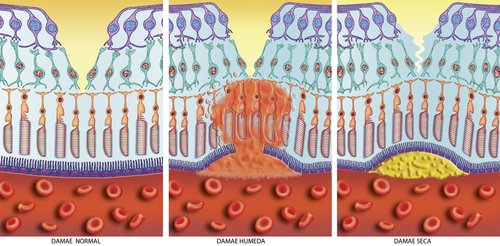
When I asked my doctor questions and told him what I’d learned in my research about AMD, which included the injections, he smiled and said, “You’re all over this, aren’t you?” I had my first injection right then—Valentine’s Day, 2007.
It’s so important that we don’t fall into denial. It’s just as important that we work together with our retina specialist so both of us understand what’s going on with our eyes.
The old saying “knowledge is power” is only true if you use the knowledge you’re given. I didn’t let my first bad experience keep me from finding the help I needed. Keep going until you find a doctor that listens to you; it’s all about mutual respect.
Sharing my experiences with the “listeners” was so helpful that I almost wasn’t afraid, almost. I would be fibbing if I said the anticipation of a needle in my eye didn’t create a little bit of tension. It was like the white-knuckled grip one has on the arms of the dentist office chair.
However, after 70 injections so far, now in both eyes I can honestly tell you, the shots from the dentist are worse. (No offense intended to any dentists that may be here.)
At first, in fact until just recently, I didn’t want anyone to know about my macular degeneration. After all, who wants to hire an expensive photographer with vision problems? I made up stories—some quite outrageous—about why my eyes were occasionally red, and worse—why I wasn’t wearing make-up.
I used everything from a broken blood vessel to playing rough with my puppy. Then I realized, with help, that I’m still me. I’m still talented, I can still teach, and I can still offer my clients beautiful portraits. Thanks to great communication with a wonderful retina specialist, I can still see.
Macular Degeneration Vision Aids
I encourage you all to see your doctor regularly, follow a macular degeneration diet , eat fish (I hated fish, but love it now), get some leafy greens, take the right vitamins and use an Amsler Grid daily.
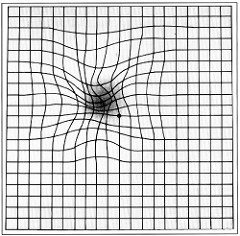
Your results may not be the same as mine, but there’s every hope that you can maintain your vision, maybe even improve it. I’ve been in business for myself since I was fourteen years old. I have no intention or desire to retire, but when I do, I want it to be a choice, not a sentence.
I’ve made necessary adaptations. I work using a 30” computer monitor; I have a talking direction device (GPS) in my car, which can help anyone, AMD or not, and I thank God every day for auto-focus on my cameras. I still paint with both traditional media and electronic brushes, and I still hate glasses.
With both eyes now wet, I know the importance of doing my research and being an informed patient.
I can see my beautiful family and I have no more nightmares about losing my crayons. I may have to become an abstract artist someday, but for now my world is filled with color!
Go from Macular Degeneration Prognosis Story to Macular Degeneration Prognosis
Go from Macular Degeneration Prognosis to WebRN Macular Degeneration Home
√ Prevention of Macular Degeneration?
√ Tips for Daily Living?
√ Food Suggestions for a Macular Degeneration Diet?
√ Ideas on Visual Aids to Maximize your Sight?
If you said "yes" to any of the above, sign up for the monthly Macular Degeneration News.
